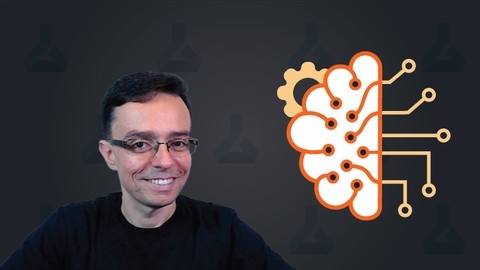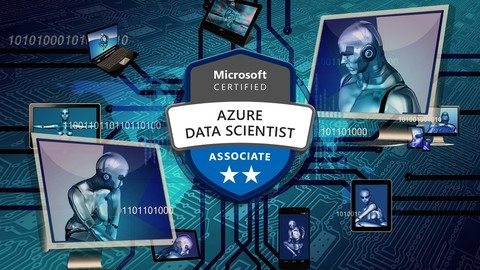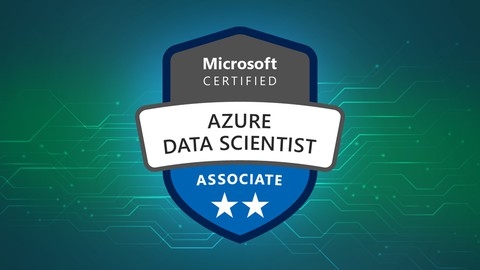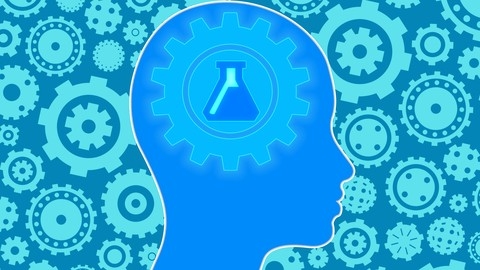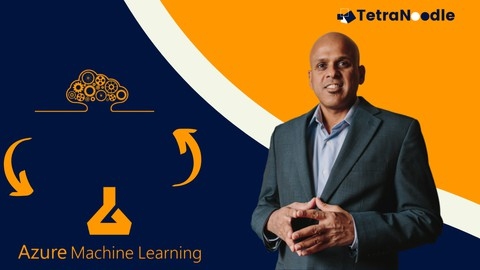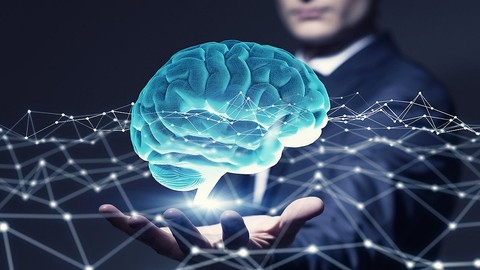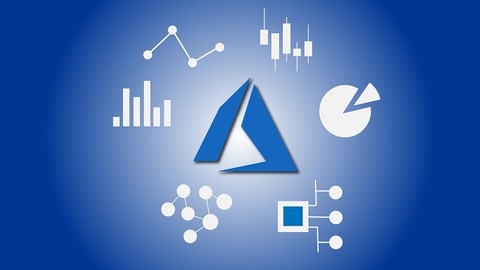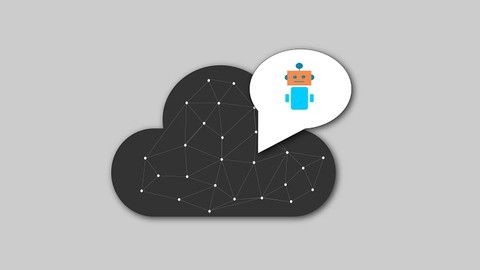Azure Machine Learning is a powerful cloud-based platform that empowers businesses to build, deploy, and manage machine learning models at scale.
By mastering Azure Machine Learning, you can unlock a world of possibilities, from creating personalized customer experiences to automating complex processes and gaining valuable insights from data.
Finding the right Azure Machine Learning course on Udemy can be overwhelming, with so many options available.
You’re looking for a course that’s comprehensive, engaging, and taught by experts, but also fits your learning style and goals.
You want a course that goes beyond theory, providing practical experience and hands-on projects to solidify your understanding.
We’ve reviewed countless courses and based on our analysis, DP-100: A-Z Machine Learning using Azure Machine Learning is the best course on Udemy overall.
This comprehensive course covers everything from the fundamentals of machine learning to advanced concepts like automated machine learning and model interpretability.
It features a blend of theoretical knowledge and practical application, with numerous hands-on exercises and projects to reinforce your learning.
While this is our top pick, there are other great options available on Udemy.
Keep reading to explore our recommendations for different learning styles and goals, from beginner-friendly introductions to advanced courses focused on specific Azure Machine Learning services and techniques.
DP-100: A-Z Machine Learning using Azure Machine Learning
You will start by learning the fundamentals of machine learning, including key concepts, types of models, and common terms.
The course then dives into Azure Machine Learning, covering the architecture, workflow, and model selection process.
You will learn how to set up an Azure ML workspace, create datastores and datasets, and utilize compute resources like clusters and instances.
A significant portion focuses on using the Azure ML Studio Designer to run experiments, train models, deploy real-time and batch inference endpoints, and perform data processing tasks like normalization and cleaning missing data.
You will gain hands-on experience with classification algorithms like logistic regression and decision trees, as well as regression techniques like linear regression.
The course also covers using Python libraries like Pandas and Scikit-learn for data manipulation and model building.
You will learn how to use the AzureML SDK to create and register datastores, datasets, run experiments, train models, and deploy web services.
Advanced topics like automated machine learning, hyperparameter tuning with HyperDrive, and model interpretability using techniques like Shapley values are also covered.
Additionally, you will explore integrating Azure Machine Learning with Databricks for big data processing using Spark.
The course includes a Python crash course and an overview of Azure fundamentals to provide a solid foundation.
Throughout the course, you will work on practical examples and hands-on exercises, ensuring you gain real-world experience in applying machine learning techniques using Azure’s powerful tools and services.
Azure Machine Learning & MLOps : Beginner to Advance
You’ll kickstart your journey with an introduction to the Azure Machine Learning Service and Azure DevOps, setting up the necessary configurations for seamless MLOps workflows.
Hands-on lectures guide you through creating and deploying infrastructure as code pipelines, enabling continuous integration (CI) and continuous deployment (CD) for machine learning models.
The course dives deep into the Azure ML SDK V2, an accelerator designed to streamline the machine learning lifecycle across multiple workspaces.
You’ll also explore highly demanded capabilities like Responsible AI, which empowers you to assess model fairness, explainability, and potential biases.
Imagine leveraging Azure Machine Learning Pipelines to orchestrate and schedule every step of your ML process with ease.
Or harnessing the power of Feature Store (Feast) to build, manage, and share features seamlessly.
The syllabus covers advanced topics like distributed processing with Ray and Dask, AutoML for Computer Vision and Natural Language Processing, and even training thousands of models in parallel.
From monitoring data drift to integrating Azure Synapse and Databricks, you’ll gain a comprehensive understanding of the Azure ML ecosystem.
Deploy multi-model endpoints, implement blue-green deployments, and even consume your models in Power BI or low-code Power Apps.
The course keeps you future-ready by exploring cutting-edge technologies like ONNX for platform-agnostic model deployment and the integration of Azure with OpenAI’s generative AI capabilities.
Machine Learning No-Code Approach: Using Azure ML Studio
This course is a great introduction to Machine Learning using the powerful Azure ML Studio platform.
You’ll begin by exploring the different categories of Machine Learning, ensuring you choose the right approach for your projects.
Setting up a free Azure account gives you a hands-on environment to learn and experiment.
The course uses real-world datasets like the Titanic and Iowa Housing Market to teach you how to work with data, clean it up, and analyze it for insights.
You’ll learn the fundamental techniques of classification using the Titanic dataset, predicting passenger survival based on their characteristics.
This hands-on experience guides you through feature selection, data splitting, model training, and evaluation.
Next, you’ll refine your skills with the Iris Flower dataset, learning advanced techniques like feature selection, handling missing data, and optimizing your model for better performance.
This course takes you beyond the basics of Machine Learning, teaching you how to deploy your models for real-world applications.
You’ll dive into regression with the Iowa Housing Market dataset, predicting house prices based on factors like location and size.
Finally, you’ll learn how to refine your regression model by experimenting with different features and hyperparameter tuning for improved accuracy.
The course provides a solid foundation in Machine Learning concepts and Azure ML Studio, equipping you with the skills to tackle your own data-driven projects.
DP-100: Azure Machine Learning & Data Science Exam Prep
You will start by learning how to create resources like workspaces, compute instances, and datasets in Azure Machine Learning.
The course then dives into the Azure ML Designer, where you’ll learn to build machine learning pipelines, preprocess data, train models using algorithms like linear regression, decision trees, and neural networks, and evaluate results.
You’ll also learn how to deploy your trained models as real-time and batch inference pipelines, making them accessible as web services.
The course covers data preprocessing techniques like handling missing data, normalizing datasets, and splitting data.
It also teaches you how to automate model training using pipelines and leverage AutoML for a no-code approach to building models.
The Python SDK is extensively covered, allowing you to create resources, prepare data, train models, tune hyperparameters, interpret models using explainers, and deploy models as web services.
You’ll work on projects that reinforce the concepts learned, such as building a regression model for house price prediction and a classification model for income prediction.
The course also introduces you to Azure fundamentals like virtual machines, managed compute services (App Service, Containers, Serverless), storage (Blob Storage, Files), and databases (Relational, NoSQL, In-Memory).
You’ll learn about key concepts like scaling, load balancing, monitoring, and reducing costs, helping you design good solutions with Azure services.
Azure Machine Learning using Cognitive Services
You’ll start by understanding the fundamentals of machine learning, exploring its distinction from artificial intelligence and encountering real-world applications to ignite your curiosity.
Next, you’ll dive into the practical aspects, setting up your Azure subscription and mastering Python, a language widely used in machine learning, through Google Colaboratory.
You’ll gain essential programming skills, from manipulating variables and lists to crafting functions and slicing data – crucial tools for working with data and developing models.
The course then delves into specific Azure Cognitive Services, beginning with Text Analytics.
Here, you’ll learn to decipher the nuances of text, analyzing sentiment, extracting key phrases, removing unnecessary words, and even building a spell-checking service.
You’ll also unlock the power of the Text Translator Service, translating text between languages and identifying the language of any given text.
Moving to the world of speech, you’ll discover the Speech Translator Service, converting speech to text and vice versa across various languages.
You’ll learn to prepare your microphone for speech input and send requests for translation, expanding your capabilities in a dynamic world.
Another key area is the Language Understanding Intelligent Service (LUIS).
You’ll create intents and entities to build a language understanding model, train it, and deploy it as a service.
You’ll then learn to interact with this service to understand user input, a crucial skill for building conversational AI.
The course goes beyond text and speech, exploring Computer Vision, allowing you to analyze images, extract descriptions, perform optical character recognition, and even manipulate images by drawing lines.
The Face API empowers you to detect faces, group people, identify individuals, and even gauge emotions from faces, opening doors to powerful applications in security and user experience.
You’ll explore Content Moderation, learning how to identify and manage inappropriate language, personal information, and images, building safe and responsible applications.
The Video Indexer Service allows you to analyze videos, extracting valuable information like people, key moments, and even generating thumbnails, making your video content more engaging and accessible.
The Custom Vision Service equips you to create your own image classification models, training them to recognize specific objects in images, opening up possibilities for innovative image analysis.
Finally, the course introduces Bot Services, where you’ll learn to create a bot that utilizes Custom Vision functionality and connect it to popular channels like Facebook Messenger, bridging the gap between AI and user interaction.
Throughout the course, you’ll work with Azure Machine Learning Studio, learning to manipulate data, train models, and deploy web services.
You’ll even test your web services to ensure they’re functioning correctly.
Machine Learning In The Cloud With Azure Machine Learning
This course provides a solid foundation in Azure Machine Learning, guiding you through the process of building and deploying predictive models.
You’ll start by understanding the fundamentals of Azure ML and its capabilities.
The course then dives into Azure Machine Learning Studio, where you’ll gain hands-on experience building experiments.
You’ll learn essential data manipulation techniques, using practical examples like the “doctors’ appointments” dataset.
You’ll master the process of preparing, exploring, and visualizing data, ultimately building an experiment, running it, and even deploying a web service to share your results.
The course goes beyond the basics, showing you how to predict housing prices with Azure ML.
You’ll work with a real-world dataset, learning how to edit column metadata and run your experiment effectively.
Finally, you’ll be equipped to deploy a web application using Azure ML, understanding how to leverage the Azure cloud and create a functional web service.
This course is particularly valuable for its emphasis on hands-on practice and its focus on real-world applications.
It teaches you not just the theory but also the practical skills needed to use Azure ML for real-world predictive modeling.
Machine Learning With Azure DevOps
This syllabus outlines a comprehensive exploration of Azure MLOps, a critical aspect of modern machine learning.
You’ll embark on a journey from the fundamentals of Azure MLOps and its application in machine learning, to the practical implementation of these concepts.
Get ready to dive deep into Azure DevOps, the robust platform that will empower you to manage your machine learning projects effectively.
You’ll gain a thorough understanding of the resources available in Azure Machine Learning, equipping you with the tools and services necessary to build powerful models.
The syllabus promises a hands-on experience, with a walkthrough of Azure ML source code providing a practical understanding of the underlying mechanics.
You’ll learn to navigate the Azure ML implementation process, from building and training models to deploying them for real-world applications.
A key focus is the creation of MLOps pipelines, which streamline your machine learning workflow from end to end.
This course empowers you to leverage your newly acquired Azure DevOps expertise, coupled with the capabilities of Azure Machine Learning, to build efficient and robust pipelines that automate your machine learning projects.
Learn Data Science and Machine Learning on Microsoft Azure
You’ll start with the powerful Power BI tool, learning to build various chart types, from simple bar charts and line charts to interactive pie charts and ring charts.
You’ll explore advanced techniques like drill-down analysis using treemaps, and discover how to create dynamic dashboards with customized datasets.
You’ll even learn to create visually engaging animated charts and maps, telling compelling data stories through your visualizations.
Next, you’ll dive into data cleaning with Power Query, mastering techniques to refine your data and prepare it for analysis.
You’ll then transition to Python and Matplotlib, building advanced charts, installing necessary packages, and applying techniques like creating line charts with custom labels and dashed scatterplots.
Finally, you’ll explore the world of cloud-based machine learning with Azure.
You’ll learn the fundamentals of computer vision, building services to analyze images, extract text, and generate thumbnails.
This course offers a strong foundation in data visualization, data cleaning, and the basics of machine learning on Azure.
Machine Learning and Blockchain with Microsoft Azure
This course is a comprehensive deep dive into the worlds of machine learning and blockchain, leveraging the power of Microsoft Azure.
You’ll start with the fundamentals of machine learning, understanding its relationship to artificial intelligence and exploring the potential of Azure Cognitive Services.
From there, you’ll jump right into building chatbots, using practical examples to create interactions with web interfaces and Facebook Messenger.
You’ll learn how to connect your bot with Facebook apps, manage credentials, and even understand how to deploy and delete resources.
The course then introduces you to the power of QnA Maker services, allowing you to build knowledge bases for your chatbots.
This equips you to create chatbots that provide accurate and helpful information.
Next, you’ll explore LUIS (Language Understanding Intelligent Service) for designing and deploying natural language understanding applications.
Microsoft’s Custom Vision service takes center stage as you learn to build powerful image recognition models.
You’ll gain hands-on experience uploading images, adding tags, and training models to identify objects in unlabeled images.
You’ll also explore other valuable AI tools like Computer Vision, Content Moderator, and Text Analytics, which empower you to analyze images, moderate content, and extract key information from text.
The course then transitions seamlessly to blockchain technology.
You’ll get a solid grounding in blockchain fundamentals, including Bitcoin and smart contracts.
The course guides you in creating and configuring Azure Blockchain Workbench, a platform designed for building decentralized applications.
You’ll explore different types of blockchains and delve into writing smart contracts using JavaScript and Solidity.
The course culminates in creating a blockchain application, where you’ll learn to add users, manage asset transfers, and control contracts.
You’ll be equipped with the knowledge and skills to build and deploy your own applications on the Azure platform, opening doors to exciting possibilities in these rapidly evolving fields.
